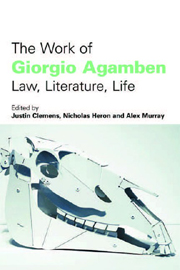Book contents
- Frontmatter
- Contents
- Acknowledgements
- Notes on Contributors
- The Enigma of Giorgio Agamben
- 1 K
- 2 Integral Actuality: On Giorgio Agamben's Idea of Prose
- 3 The Role of the Shifter and the Problem of Reference in Giorgio Agamben
- 4 ‘Its Silent Working was a Delusion’
- 5 Politics and Poetics of Divine Violence: On a Figure in Giorgio Agamben and Walter Benjamin
- 6 Idea of Poetry, Idea of Prose
- 7 The Fading Memory of Homo non Sacer
- 8 Soulblind, or On Profanation
- 9 Face to Face with Agamben; or, the Other in Love
- 10 Beyond Spectacle and the Image: the Poetics of Guy Debord and Agamben
- 11 Dismantling Theatricality: Aesthetics of Bare Life
- 12 Notes on Media and Biopolitics: ‘Notes on Gesture’
- Index
9 - Face to Face with Agamben; or, the Other in Love
Published online by Cambridge University Press: 12 September 2012
- Frontmatter
- Contents
- Acknowledgements
- Notes on Contributors
- The Enigma of Giorgio Agamben
- 1 K
- 2 Integral Actuality: On Giorgio Agamben's Idea of Prose
- 3 The Role of the Shifter and the Problem of Reference in Giorgio Agamben
- 4 ‘Its Silent Working was a Delusion’
- 5 Politics and Poetics of Divine Violence: On a Figure in Giorgio Agamben and Walter Benjamin
- 6 Idea of Poetry, Idea of Prose
- 7 The Fading Memory of Homo non Sacer
- 8 Soulblind, or On Profanation
- 9 Face to Face with Agamben; or, the Other in Love
- 10 Beyond Spectacle and the Image: the Poetics of Guy Debord and Agamben
- 11 Dismantling Theatricality: Aesthetics of Bare Life
- 12 Notes on Media and Biopolitics: ‘Notes on Gesture’
- Index
Summary
Seeing something simply in its being-thus – irreparable, but not for that reason necessary; thus, but not for that reason contingent – is love.
Giorgio AgambenWhen every sweet embrace has faded
The voices dip, the faces dim and memory drifts away –
Still you stay in everyone you hold.
Peter HammillLove is found everywhere in the text of Giorgio Agamben. We should neither confuse nor conflate ‘love’ with either desire or any erotism, as I shall go on to explain. Separating what is already other than these clinical and classical terms, love must be maintained as other to them. Neither synonymous nor supplementary, love remains in Agamben as that for which we will have to account in a language that, though indirect, must keep itself separate from the philosopher's economy. More than merely ‘found’, as if it were encountered, scattered like the wind-blown detritus of hastily ripped apart love letters, love places itself in one's way. The subject in reading is interrupted by love, as if it arrived to call the reader, to become the beloved, ‘in the spirit of a pseudo-Platonic letter’. It appears momentarily, here and there, disposing of its traces, in between one subject and another, or as the visible manifestation for the reader, the ‘illumination’ of and for a subject otherwise remaining unrepresentable. Hardly a subject at all, except in the example of one essay, ‘The Passion of Facticity’, which perversely and ingeniously speaks to the trace of love precisely at those places where it is found only in absentia, love remains, nonetheless – and as a trope, a topos, a souvenir.
- Type
- Chapter
- Information
- The Work of Giorgio AgambenLaw Literature Life, pp. 149 - 163Publisher: Edinburgh University PressPrint publication year: 2008



